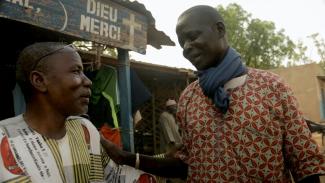Mental health
Removing the chains

“Who among you is in chains?” asks Pastor Tankpari Guitanga, addressing the people who have come to his mobile consultation hours in Piéla in north-eastern Burkina Faso. A few people step forward or are led out of the waiting area by their relatives. They are wearing thick, rusty chains on their wrists or ankles that are locked with padlocks. Guitanga and his assistants saw the chains off in a literal act of liberation that often comes after years or even decades of confinement. The scene is captured in the documentary film “La maladie du démon” (“The demon disease”).
German filmmaker Lilith Kugler shows the fate that people with mental illnesses or epilepsy suffer in Burkina Faso. In the West African country, there are nine psychiatrists and about 100 psychiatrically trained nurses for 17 million residents. They all work in larger cities. In rural areas, relatives care for the affected people themselves or deliver them to prayer centres or traditional centres for the mentally ill.
In Burkina Faso, mental illnesses and epilepsy are thought to be caused by demons (see also Samir Abi in D+C/E+Z e-Paper 2019/06, Focus section) and are considered untreatable and, what’s more, contagious. For that reason, people are afraid of those who are afflicted. They lock them away, beat them, chain them up or just leave them to fend for themselves – even in the centres. In the film, a pastor who runs a prayer centre justifies these inhumane measures as follows: “Without chains, they will run away or kill themselves.” Medication is generally rejected. The pastor also says: “You just need to believe in God. Everything else is unimportant.”
In the worst cases, Guitanga explained at a podium discussion following the film’s German premiere in September, mentally ill people are even murdered. The reasons are fear and ignorance: “It is the incorrect interpretation of the disease that kills.” Guitanga founded the aid organisation Yenfaabima in order to educate people about mental and neurological illnesses and help those who are affected. In the beginning, Guitanga and Timothée Tindano, a psychiatric nurse, offered consultation hours once a month in Piéla. The dates were announced over the radio and attendance was huge. A treatment building was completed in 2017, and Tindano began working for Yenfaabima full time in March of this year. The work is being financed by donations that come in large part from Germany.
The treatment is based on administering medication. Tindano provides a diagnosis and prescribes drugs. Yenfaabima employees also ensure that the medications are taken regularly and advise patients and their families. Nevertheless, the film makes clear that local pharmacies have only two drugs on hand to treat psychosis and epileptic seizures. That is a problem that Guitanga is trying to solve: “We would like to import more medications and are making good progress towards that goal.”
Heinz Weiß, the head of the department of psychosomatic medicine at the Robert Bosch hospital in Stuttgart, pointed out at the podium discussion that prescribing medication is not enough: “You have to talk to the patients and their families.” Yenfaabima is trying to have these conversations, and the reintegration of sufferers into the community is one of their most important aims. According to Weiß, the work should also be integrated into the local health-care system. However, he does not see creating more psychiatric wards in hospitals as a solution. He says that’s because “placing people there is not much better than sending them into the nearest forest”.
“The demon disease” is being shown for educational purposes in Burkina Faso and Côte d’Ivoire. “The film has returned to the place it came from,” says filmmaker Kugler. “It creates an opportunity to talk about this issue and gives people hope.”
Links
The German organisation “Friends of Yenfaabima”:
http://www.yenfaabima.de/
Documentary film “The demon disease”:
http://la-maladie-du-demon.com/








